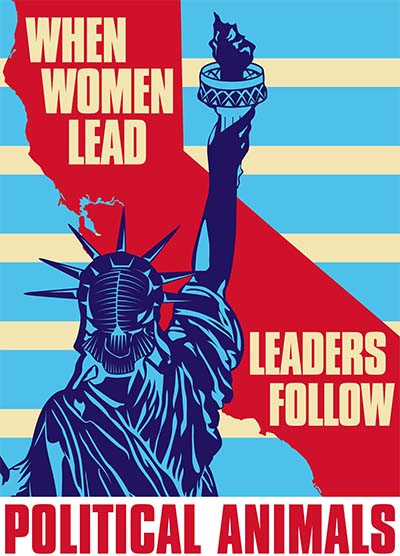We are continuing this Pride Month series of documentaries about queer issues. After last week's look at the life of Armistead Maupin, we detour into politics with Political Animals.
 It’s just a matter of fact that men are the predominant voice of cinematic history. This is hardly surprising given that men are the predominant voice of history in general, but this of course means that the stories of women make up a frustratingly small portion of those told on the silver screen (even if we may curate our own viewing experiences to counteract this). The same can sadly be said about queer cinema where films about LGBTIQ women and by women (gay or otherwise) are without a doubt outnumbered by those by and about men.
It’s just a matter of fact that men are the predominant voice of cinematic history. This is hardly surprising given that men are the predominant voice of history in general, but this of course means that the stories of women make up a frustratingly small portion of those told on the silver screen (even if we may curate our own viewing experiences to counteract this). The same can sadly be said about queer cinema where films about LGBTIQ women and by women (gay or otherwise) are without a doubt outnumbered by those by and about men.
It’s wonderful then to see Political Animals, a film that seeks to take a side-step away from the more famous names of gay politicians and activists like Harvey Milk, Larry Kramer, Cleve Jones and Barney Frank and focuses on the openly gay women from the halls of American politics. In particular, four women from California whose long and exhausting efforts in the face of bigotry across generations (although, quite telling, almost exclusively from older white men) slowly yet surely chipped away at government homophobia.
Jonah Markowitz and co-director Tracy Wares have assembled a compelling array of archival footage that charts their actions in straight-forward (some might call it simplistic, but this is a story that would not be enhanced by editorial bells and whistles) fashion, demonstrating how many of the laws that gay Californians, and many more around the country, can be directly laid at the feet of Sheila Kuehl (a star from TV in the 1950s with The Many Loves of Dobie Gillis), Carole Migden, Christine Kehoe and Jackie Goldberg. Their victories – and perhaps even more importantly, their losses that sought to solidify and build the movement exponentially – are directly responsible for the Supreme Court’s eventual ruling in 2015 that marriage was a nationwide right for everybody.
Considering the film is based almost exclusively around archival footage, and scrappy-quality public television video quality footage at that, it is once again up to the editor – in this case Michael Hofacre – to give Political Animals its greatest formal thrust. Not content to let the clips of government debates and protest play out as they might in a less attentive film, here they have been spliced and reassembled to maximise the impact of the words. The back-and-forth takes on an almost debate-like quality that only heightens the absurdity of the hate speak featured within. A modern day reunion is perhaps under-utilised, but the footage that is featured is powerful stuff.

That the documentary begins and ends with Barack Obama is, I hope, just a quirk of a protracted release and not a sign of any sort of complacency. One can only assume that had Hillary Clinton been elected, the ending of Political Animals would not have felt quite so odd. The story reached its natural conclusion, but in the face of he who shall not be named, the fight is back and the pluck of Kuehl and Migden are needed once more. Would the film have benefited from expanding upon this? I think so. Especially given how much time is devoted to talking of how revolutionary it was to have just one openly gay politician and now there are many more.
Political Animals lacks the rousing spirit of some of its more famous queer doc predecessors, finding much of its power in more humble self-reflection. From one industry that has greatly handicapped women to another, it’s great to finally have their story out there. Hopefully we can expect more of these stories to be revealed.
Release: On DVD and VOD from last week.